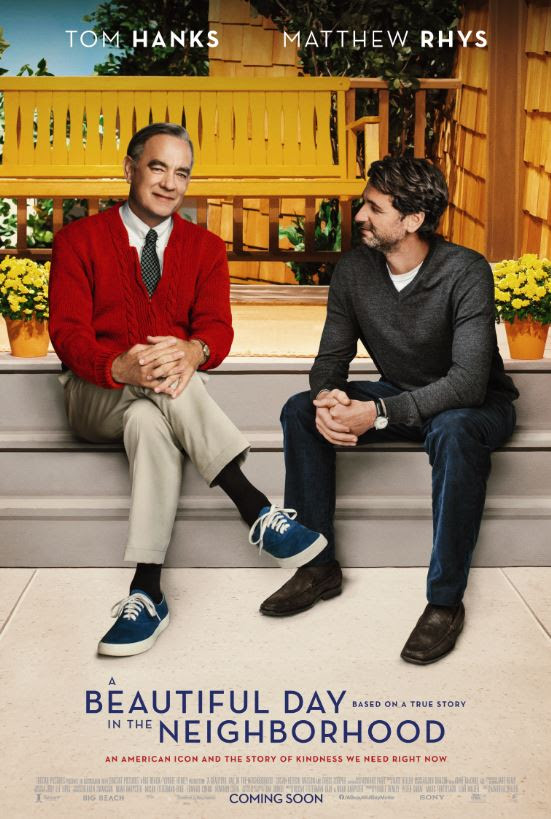
Director: Marielle Heller
Writers: Micah Fitzerman-Blue, Noah Harpster
Cast: Matthew Rhys, Tom Hanks, Susan Kelechi Watson, Chris Cooper, Tammy Blanchard
Producers: Youree Henley, Leah Holzer, Peter Saraf, Marc Turtletaub
Music: Nate Heller
Cinematography: Jody Lee Lipes
Editor: Anne McCabe
Cert: PG
Running time: 108mins
Year: 2019

What’s the story: Cynical journalist Lloyd Vogel (Rhys) is less than thrilled to be profiling children’s entertainer Mr. Rogers (Hank). But, their meeting might be lifechanging for the writer.

What’s the verdict: With Operation Yewtree looming large over formerly idyllic childhood viewing, in the minds of the British public the last few years have altered what it means to be a beloved children’s entertainer.
As such, it’s understandable that UK audiences might not be entirely comfortable with the notion of Mr. Fred Rogers, host of the beloved US kids’ TV show Mr. Rogers’ Neighborhood.
Rogers’ reputation for niceness and decency verges on sainthood; a term he, in the nicest possible fashion, pooh-poohed. Soft-spoken and gentle, in comfy red cardigan and sneakers – the lacing of which formed part of the opening of every show – he seems utterly unthreatening.
Given which, watching Won’t You Be My Neighbor?, a documentary on Rogers’ life, career and impact that screened at last year’s London Film Festival, this reviewer found himself primed for a revelation along the lines of, “And then they discovered the bodies…”.
Fortunately, that revelation never came. Instead, audiences were treated to a rewarding account of public service and genuine humanitarianism. A desire to educate kids on difficult subjects, such as dealing with weighty topics like death, anxiety, parents’ divorce. As Rogers would say, if it can be mentioned, it can be managed.
Upon learning of a biopic, of sorts, to be directed by Marielle Heller (Can You Ever Forgive Me?, Diary of a Teenage Girl) the first thought was inevitably, who could hope to embody this paragon of goodness?
The answer should have been obvious: Thomas Jeffrey Hanks. The nicest man in Hollywood portraying perhaps the nicest man to ever work on television.

This creates such a white hole of empathy, you feel the Hanks-Rogers paragon, bushy-browed and benevolent, might detect you through the screen, know at once your deepest regrets and absolve them.
That doesn’t happen, but A Beautiful Day In The Neighborhood does offer a refreshing take on the conventional biopic. Perhaps becoming the first in which the actor playing its subject might be nominated for a Best Supporting Actor Oscar.
De facto protagonist here is journalist Lloyd Vogel (Rhys), a character based on Tom Junot, whose Esquire profile of Mr. Rogers, Can You Say… Hero?, is the basis for the film.
Lloyd is not so much careworn, as care-beaten; a point made clear from the moment we first see him, bruised and blooded in a photo introduced by Mr. Rogers on an episode of his Neighborhood.
Husband to Andrea (Watson) and recently a dad, Lloyd is considered to be a talented but troubled writer. Much of this inner turmoil stems from his relationship with estranged father Jerry (a caddish Cooper), and a wrong Jerry committed in Lloyd’s childhood.
An attempted reconciliation at the wedding of Lloyd’s sister (Blanchard) leads to an exchange of blows not just limited to Lloyd-Jerry-Lloyd. Given which, he might not seem the most natural choice to write a puff piece on national father figure Mr. Rogers, an assignment Lloyd approaches with less than the expected enthusiasm and lightness.
Travelling from New York to Pittsburgh, where Mr. Rogers records his show, Lloyd finds himself in Rogers World, where a team of craftspeople unassumingly wait for him to finish talking to a Make-A-Wish kid before shooting resumes.

Cynical Lloyd is unprepared for a man who communicates through puppets, who advocates channelling anger by hammering the lowest notes on the piano. A Beautiful Day In the Neighborhood, scripted by Micah Fitzerman-Blue and Noah Harpster, presents Mr. Rogers as someone of great emotional intelligence and a degree of repression.
Lloyd sees him operate Daniel Striped Tiger from behind the castle set, head turned away, as though the puppet were a private depository of his pain and sadness. Then again, in one of the year’s best scenes, Hanks-Rogers is fully engaged; sitting with Lloyd in a Chinese restaurant for a literal minute’s silence and reflection.
The film deals with Lloyd’s anger in the face of Rogers’ limitless empathy, and itself becomes an extension of Mr. Rogers’ own neighbourhood. New York City is shown in model form – charmingly realised cardboard skyscrapers, bridges, lights. Jody Lee Lipes’ cinematography is hard and grainy, recalling the unflattering video era of the show itself, yet suited to the deceptive rawness of the material.
Nat Heller’s score runs with this emotional undercurrent, filling in the long pauses of Fred just… listening to whomever he’s talking to, or wrestling with putting up a tent, or any other of a hundred things from which a child might learn.
Director Heller is a master of exploring the inner lives of misfits, but Fred Rogers’ inner light is one that shines outwards; one that, in his ministering, illuminates Lloyd Vogel, leading him to confront aspects of himself he’d rather not.
Hanks is warm, sad, funny and canny as Rogers, while Rhys takes an arguably more one-note character and matches the Hollywood legend in the tango between the two as a man slowly released from emotional paralysis.
A Beautiful Day in the Neighborhood’s biggest success is, as with the documentary that preceded it, to make you believe in the power of human goodness; from subway sing-alongs, to empathy, to forgiveness (even for someone who may not deserve it).
As life-affirming cinema goes, it doesn’t get more sincerely feelgood than this.
Rob Wallis
Twitter:@robertmwallis
Website:www.ofallthefilmsites.com
Podcast: The Electric Shadows Podcast
